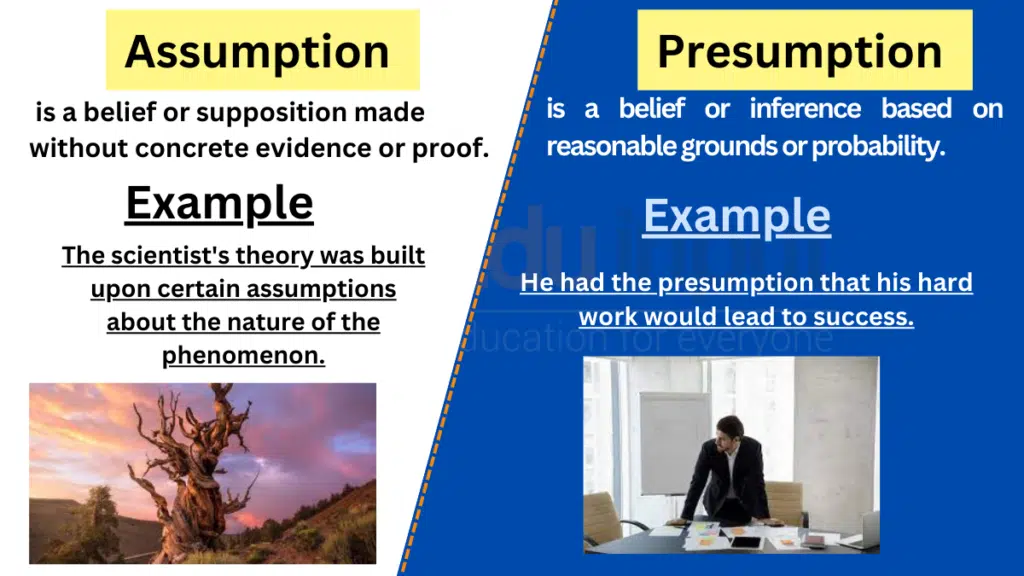Assumption vs Presumption-Difference Between and Examples
“Assumption” and “presumption” are similar words with different meanings. This article will explore their definitions, differences, and usage to understand their implications. By discerning between these words, we can navigate inferences effectively. Let’s delve into the distinctions between “assumption” and “presumption.”

Meanings and Examples
Assumption meaning
It is a noun. Its meaning is a belief or supposition made without concrete evidence or proof.
Examples
a) She made the assumption that he would be late based on his previous behavior.
b) The scientist’s theory was built upon certain assumptions about the nature of the phenomenon.
c) We should question our assumptions and seek empirical data to validate our conclusions.
d) His assumption of her intentions turned out to be completely incorrect.
e) The lawyer challenged the witness’s assumption about the defendant’s guilt.
Presumption meaning
It is a noun. Its meaning is a belief or inference based on reasonable grounds or probability.
Examples
a) The presumption of innocence is a fundamental principle in the legal system.
b) He had the presumption that his hard work would lead to success.
c) The manager’s presumption about the employee’s capabilities proved to be accurate. d) We should not make presumptions about someone’s intentions without sufficient evidence.
e) Her presumptions about the outcome of the experiment were based on previous research.
Difference between Assumption and Presumption
| Criteria | Assumption | Presumption |
| Meaning | A belief or supposition without concrete evidence | A belief or inference based on reasonable grounds |
| Part of Speech | Noun | Noun |
| Pronunciation | əˈsʌm(p)ʃ(ə)n | prɪˈzʌmpʃ(ə)n |
| Usage | Speculating without evidence | Making reasonable inferences |
Grammatical Aspects
Verb:
Assumption: “Assumption” does not function as a verb.
Presumption: “Presumption” does not function as a verb.
Adjective:
Assumption: “Assumption” does not have an adjective form.
Presumption: “Presumption” does not have an adjective form.
Adverb:
Assumption: “Assumption” does not have an adverb form.
Presumption: “Presumption” does not have an adverb form.
Usage in a Paragraph
She made an assumption about her colleague’s absence from the meeting, assuming that he had forgotten to mark it in his calendar. However, her presumption was incorrect. Later, she learned that he had informed the team in advance about his unavoidable absence due to a family emergency. This incident served as a reminder to not jump to conclusions based on assumptions and to rely on accurate information before forming judgments.
Distinguishing between “assumption” and “presumption” is crucial for clear and precise communication. “Assumption” refers to a belief or supposition made without concrete evidence, while “presumption” involves making inferences based on reasonable grounds or probability. Understanding the differences between these words allows us to navigate the complexities of inferences and suppositions, ensuring accuracy and clarity in our communications.



Leave a Reply